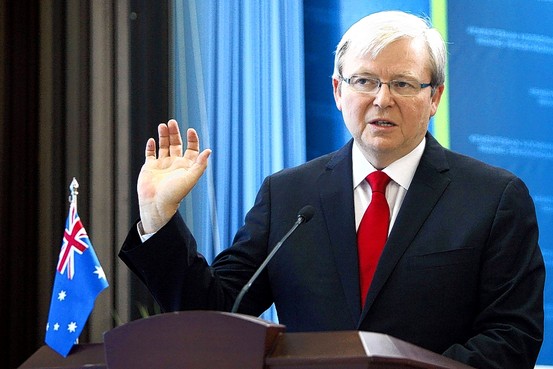Australia Makes Third Way Easier on Passports
SYDNEY—In an effort to boost sexual and gender equality, Australia will make it easier for its citizens to apply for passports that reflect a third gender that is neither male nor female, or a gender different from the one on their birth certificate.
Transgender people who haven't had sex-reassignment surgery will now be able to select their new gender on the passport application, and the process of applying for a passport designating the holder as intersex—neither male or female—will be simpler, the government said.
"This amendment makes life easier and significantly reduces the administrative burden for sex- and gender-diverse people who want a passport that reflects their gender and physical appearance," Foreign Minister Kevin Rudd said. Medical documents to support the application still will be required.
The measure is a symbolic victory for equality campaigners in Australia, a nation with something of a mixed record. Sydney and other big cities have vibrant gay cultures, and a number of prominent politicians, including Finance Minister Penny Wong and Greens party leader Bob Brown, are openly gay, but same-sex marriage remains a vexing political issue.
"I think it is enormously symbolic, particularly for intersex people because having recognition of being intersex and not simply a man or a woman, that's a really big deal," said Jennifer Germon, a lecturer in Gender and Cultural Studies at the University of Sydney. It is estimated that one in every 2,000 live births world-wide is intersex, but no official figures are available for Australia, Ms. Germon said.
The sometimes ambiguous issue of gender came under the international spotlight in 2009 when world-champion runner Caster Semenya of South Africa was barred from competition by the International Association of Athletics Federations pending tests to verify that she is a woman. She was cleared to compete again in 2010.
People in the U.K. and U.S. already are able to get travel documents that show a gender other than the one of their birth. Canada allows it only for postsurgical transgenders, while New Zealand relies on a family court to judge a person's gender.
For Norrie May-Welby, 50, an Australian born in Scotland who underwent sex-change surgery in 1989 to become neuter, the new process comes just in time. May-Welby, who identifies as gender-nonspecific, is applying for a new passport and says previous travel hasn't always been easy.
"I've been seeking legal documents that say 'nonspecific.' I don't fit either box and a lot of people don't," May-Welby said. "Once I was randomly checked in customs—it was in Australia. I was lucky there, but I still don't want a passport that doesn't match my identity. It's easy to explain it to an Australian, but you want the paper to say the right thing if you're in Uzbekistan."
Source
Transgender people who haven't had sex-reassignment surgery will now be able to select their new gender on the passport application, and the process of applying for a passport designating the holder as intersex—neither male or female—will be simpler, the government said.
"This amendment makes life easier and significantly reduces the administrative burden for sex- and gender-diverse people who want a passport that reflects their gender and physical appearance," Foreign Minister Kevin Rudd said. Medical documents to support the application still will be required.
The measure is a symbolic victory for equality campaigners in Australia, a nation with something of a mixed record. Sydney and other big cities have vibrant gay cultures, and a number of prominent politicians, including Finance Minister Penny Wong and Greens party leader Bob Brown, are openly gay, but same-sex marriage remains a vexing political issue.
"I think it is enormously symbolic, particularly for intersex people because having recognition of being intersex and not simply a man or a woman, that's a really big deal," said Jennifer Germon, a lecturer in Gender and Cultural Studies at the University of Sydney. It is estimated that one in every 2,000 live births world-wide is intersex, but no official figures are available for Australia, Ms. Germon said.
The sometimes ambiguous issue of gender came under the international spotlight in 2009 when world-champion runner Caster Semenya of South Africa was barred from competition by the International Association of Athletics Federations pending tests to verify that she is a woman. She was cleared to compete again in 2010.
People in the U.K. and U.S. already are able to get travel documents that show a gender other than the one of their birth. Canada allows it only for postsurgical transgenders, while New Zealand relies on a family court to judge a person's gender.
For Norrie May-Welby, 50, an Australian born in Scotland who underwent sex-change surgery in 1989 to become neuter, the new process comes just in time. May-Welby, who identifies as gender-nonspecific, is applying for a new passport and says previous travel hasn't always been easy.
"I've been seeking legal documents that say 'nonspecific.' I don't fit either box and a lot of people don't," May-Welby said. "Once I was randomly checked in customs—it was in Australia. I was lucky there, but I still don't want a passport that doesn't match my identity. It's easy to explain it to an Australian, but you want the paper to say the right thing if you're in Uzbekistan."
Source

